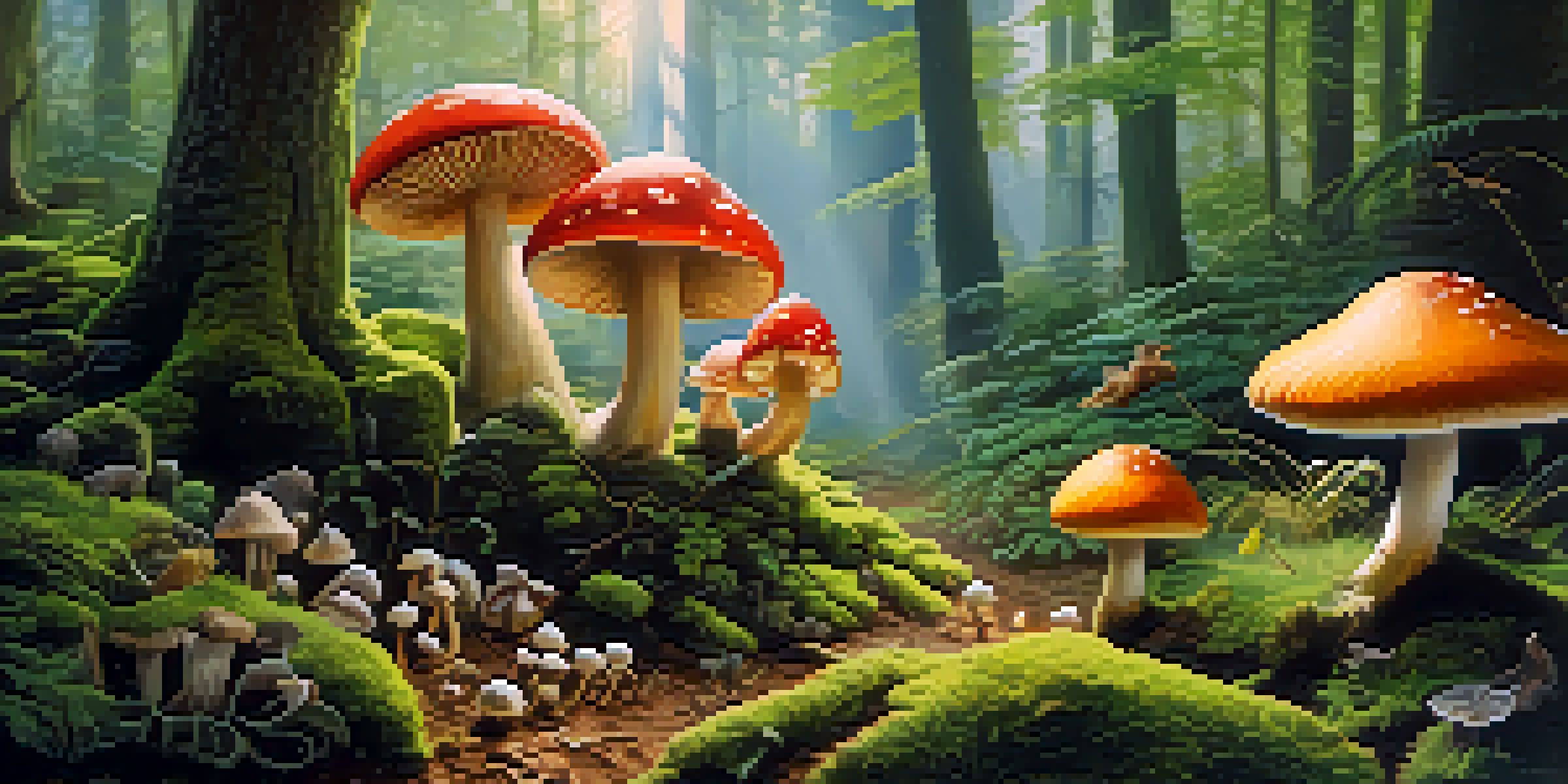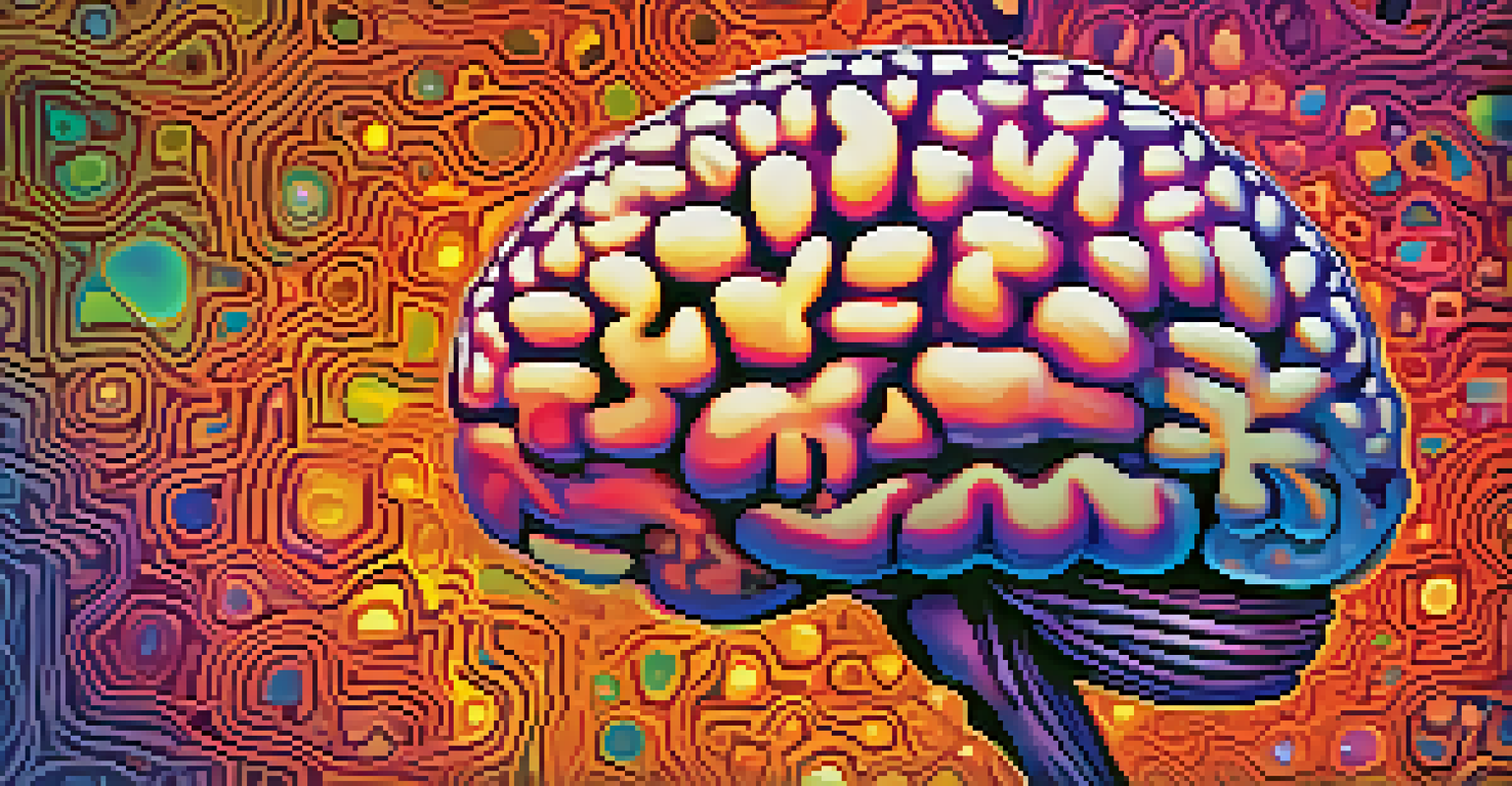The Impact of Psilocybin in Treating Depression Today

Understanding Psilocybin and Its Effects
Psilocybin is a naturally occurring compound found in certain mushrooms, often referred to as 'magic mushrooms.' When ingested, it transforms into psilocin, which affects serotonin receptors in the brain. This interaction can lead to altered perceptions and a heightened sense of awareness, making it a unique candidate for treating mental health disorders, particularly depression.
Psychedelics can help us understand the brain, but they can also help heal it.
Research has shown that psilocybin can promote neuroplasticity, the brain's ability to form new connections, which is crucial for overcoming depression. Instead of simply masking symptoms, psilocybin may help address the root causes of depressive thoughts, offering a more holistic approach to mental health.
As more studies emerge, psilocybin is gaining recognition as a potential therapeutic tool. Understanding its effects is essential for grasping its role in contemporary depression treatment.
The Rise of Psilocybin Research
In recent years, there’s been a surge in research surrounding psilocybin, particularly in its application for mental health treatment. Institutions like Johns Hopkins University have led groundbreaking studies that highlight its efficacy in reducing symptoms of depression and anxiety, especially in patients who have not responded to traditional treatments.

These studies have revealed that a single session with psilocybin can lead to significant improvements in mood and outlook, lasting weeks or even months. This long-lasting impact contrasts sharply with conventional antidepressants, which often require ongoing use for effect.
Psilocybin's Role in Depression
Psilocybin promotes neuroplasticity and offers a holistic approach to treating depression by addressing root causes rather than just symptoms.
As the stigma surrounding psychedelics continues to decrease, more researchers are advocating for clinical trials and regulatory changes, paving the way for psilocybin to be integrated into mental health care.
How Psilocybin Works in the Brain
Psilocybin's effectiveness in treating depression largely stems from its ability to interact with serotonin receptors, particularly the 5-HT2A receptor. This interaction can lead to enhanced emotional processing and a shift in perspective, allowing individuals to confront and reframe their negative thoughts.
The mind is like a parachute. It doesn’t work if it isn’t open.
During a psilocybin experience, users often report feelings of interconnectedness and profound insights about their lives. This can help break the cycle of rumination that often traps those with depression, enabling a fresh outlook on personal challenges.
Moreover, psilocybin has been shown to decrease activity in the default mode network (DMN), the area of the brain associated with self-referential thoughts. By quieting the DMN, psilocybin allows for a more open and expansive mental state.
Clinical Trials and Their Promising Results
Numerous clinical trials have demonstrated the potential of psilocybin in alleviating depression symptoms. For instance, a study published in 'JAMA Psychiatry' found that participants showed significant improvements in depression scores after just one or two doses of psilocybin.
These trials often involve controlled settings where patients are guided by trained therapists, ensuring safety and maximizing therapeutic benefits. This supportive environment is crucial, as the psilocybin experience can be intense and emotionally charged.
Surge in Psilocybin Research
Recent studies, particularly from institutions like Johns Hopkins, highlight psilocybin's efficacy in reducing depression and anxiety symptoms.
The promising results of these trials suggest that psilocybin could soon become a viable treatment option for those suffering from treatment-resistant depression, offering a new ray of hope for many.
Potential Benefits Over Traditional Antidepressants
One of the most significant advantages of psilocybin compared to traditional antidepressants is its rapid onset of effects. While conventional medications can take weeks to show results, psilocybin can produce noticeable changes in mood within hours or days.
Additionally, psilocybin may have fewer side effects than many antidepressants, which can include weight gain, sexual dysfunction, and withdrawal symptoms. This makes psilocybin an appealing alternative for individuals who have experienced negative side effects from conventional treatments.
Moreover, the therapeutic experience of psilocybin often leads to cathartic breakthroughs, which can encourage lasting emotional healing. This depth of experience is something traditional medications rarely provide.
Challenges and Considerations in Psilocybin Use
Despite its potential, using psilocybin for depression comes with challenges. The legal status of psilocybin varies widely, with many places still classifying it as a Schedule I substance, making research and access difficult.
Furthermore, psilocybin isn't suitable for everyone. Individuals with a history of certain psychiatric conditions, such as schizophrenia, may be at risk of adverse effects. It's essential for those considering psilocybin treatment to consult with mental health professionals.
Challenges in Psilocybin Use
Despite its potential benefits, psilocybin's legal status and suitability for all patients pose challenges for its integration into mental health treatment.
As the conversation around psilocybin evolves, addressing these challenges will be key in integrating this treatment into mainstream mental health care.
The Future of Psilocybin in Mental Health Treatment
Looking ahead, the future of psilocybin in treating depression seems promising, especially as more research validates its benefits. With growing public interest and advocacy, there is potential for policy changes that could make psilocybin more accessible to those in need.
As mental health professionals continue to explore innovative treatment methods, psilocybin therapy could become a standard part of depression care, particularly for patients who have not found relief through traditional means.

Ultimately, the integration of psilocybin into mental health treatment could signify a shift towards more personalized and effective approaches, empowering individuals on their journeys to recovery.